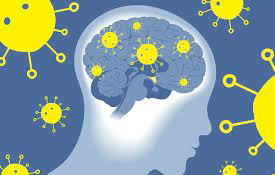Thailand Medical - COVID-19 - Memory Loss Jul 03, 2023 2 years, 7 months, 2 weeks, 3 days, 20 hours, 58 minutes ago
SARS-CoV-2 Can Invade The Neural System To Interfere With Human Memory.
Thailand Medical: In a shocking revelation, scientists from Shanghai Normal University in China and The University of Hong Kong have uncovered a distressing connection between COVID-19 infections and memory problems. This new study review has shed light on the virus's ability to invade the neural system and interfere with human memory, raising concerns about the long-term effects of the pandemic on individuals' cognitive abilities.

The research indicates that a high number of COVID-19 patients experience what is known as the Long-COVID syndrome, which encompasses a range of persistent symptoms, including memory impairment and other cognitive issues. These symptoms, often referred to as brain fog, can have a profound impact on daily life, academic performance, and overall development. The study highlights how SARS-CoV-2, the virus responsible for COVID-19, can induce pathological changes in the brain, mimicking the neuropathology seen in Alzheimer's disease.
Memory, an essential aspect of our lives, is intricately linked to various regions of the brain. For explicit memories, conscious recollection of previous experiences, the hippocampus, neocortex, and amygdala play pivotal roles. Implicit memories, acquired and retrieved unconsciously, rely on the basal ganglia and cerebellum. These regions, crucial for memory storage, can be directly affected by SARS-CoV-2 infection. Structural changes in the brain, such as reductions in the size of the orbitofrontal context, olfactory cortex, and parahippocampal gyrus, have been associated with the virus.
Researchers have observed SARS-CoV-2 replication in astrocytes, leading to neuronal death or dysfunction. The virus also triggers the release of cytokines, such as interleukin-6 (IL-6) and tumor necrosis factor-α (TNFα), which can have a profound impact on working memory and cognitive systems. These findings suggest that the immune response elicited by the virus can cross the blood-brain barrier, activating microglia and interfering with memory function.
Interestingly, it's not just adults who experience these memory issues. The Long-COVID syndrome has been observed in children as well, with reports of short-term memory problems and other cognitive impairments. Since the early stages of brain development are crucial for children's growth, the effects of viral infections on their brains can be particularly devastating. Recent studies have even reported SARS-CoV-2 infection in the central nervous system of a 14-month-old child, underscoring the virus's ability to impact young minds.
Understanding the mechanisms through which SARS-CoV-2 affects memory is essential. The virus can infect brain cells directly, triggering brain damage and memory impairment. Additionally, hyperactivation of the immune system and the formation of syncytia, or fused cells, can further exacerbate the cognitive effects.
Furthermore, the persistence of the virus in immunological sanctuaries poses a potential risk for long-term brain damage.
Co-researcher Dr Qiulu Ding from Shanghai Normal University told
">Thailand Medical News, “Even without direct viral infection in the brain, the immune responses triggered by SARS-CoV-2 can disrupt normal brain function through cytotoxic defense or the generation of autoantibodies.”
With the staggering number of COVID-19 cases worldwide, the implications of these findings cannot be overstated. The burden placed on society by even 10% of patients experiencing Long-COVID symptoms is significant. To mitigate the risk factors associated with SARS-CoV-2 infection and memory loss, prevention strategies should be implemented. These may include antiviral and symptomatic treatments, practicing proper hygiene measures, engaging in suitable exercises, maintaining regular sleep patterns, and following a balanced diet.
The study's revelations carry profound implications, especially for children who are at critical stages of brain development. The long-term effects of Long-COVID symptoms on memory can significantly impact their educational attainment and self-confidence as they grow older. By raising awareness about the negative effects of COVID-19 on memory function, health experts can work towards developing effective preventive measures and ensuring a brighter future for generations to come.
In conclusion, this research serves as a wake-up call, urging us to address the cognitive consequences of COVID-19 infections. By understanding the intricate relationship between the virus and memory impairment, individuals can take proactive steps to protect their brains and safeguard their memories.
The study findings were published in the peer reviewed journal: Cell Death Discovery (Nature)
https://www.nature.com/articles/s41420-023-01512-z
Keep on logging to
Thailand Medical News for the latest Research about SARS-CoV-2.
